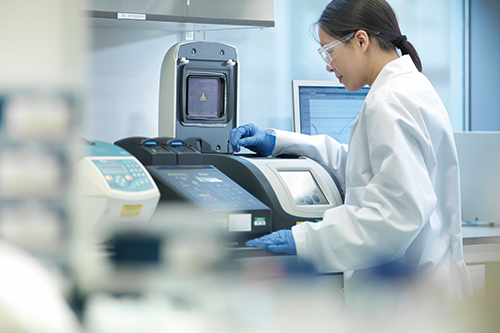Global Successes Ending a Diagnostic Odyssey: Going Beyond the Identification of Unidentified Conditions
INITIATIVE ON RARE AND UNDIAGNOSED DISEASES (IRUD)

Japan has a long history of tackling rare and intractable diseases (known locally as Nan-Byo). Building on this heritage, AMED – in collaboration with researchers and the Japanese universal healthcare system – launched the Initiative on Rare and Undiagnosed Diseases (IRUD) in 2015.
The initiative has led to the construction of a nationwide medical research consortium dedicated to helping patients receive diagnoses. The network enables primary healthcare clinics to collaborate with general hospitals and IRUD Clinical Centers, where multi-disciplinary IRUD Diagnosis Committees can review complex cases. This process is supported by five IRUD Analysis Centers throughout Japan, which administer genetic tests and share findings with the committees.
The clinical and genetic data is stored in a globally compatible patient-matching system and shared with domestic and overseas medical organizations in compliance with existing rules.
As a result, similar cases can be compared with a broader pool of patients around the world, increasing the chances of successful definitive diagnoses. Thanks to the progress of IRUD’s international data sharing, new rare diseases were identified in Canada and Lithuania – two of many countries where disease discovery through patient matching had yet to come.
As IRUD’s pioneering efforts continue to grow, so too do our next steps. “IRUD Beyond” consists of three AMED-supported pillars designed to build on IRUD research:
- Beyond Diagnosis: The invention of innovative medical drug candidates by targeting mutations discovered in IRUD research.
- Beyond Genotyping: Functional genomics studies and further attempts to address cases that remain unsolved even after next-generation sequencing analysis.
- Beyond Borders: Enhanced international data sharing via globally compatible systems.
In addition, working to fulfill AMED’s foundational role of global harmonization through valuable forums such as the International Rare Diseases Research Consortium (IRDiRC), IRUD will seek further data-sharing opportunities and ensure patients are given the best chance of receiving a definitive diagnosis.
 Concept
Concept
Construct a comprehensive medical network, establish valuable clinical databases and facilitate data sharing to propel the study of rare and undiagnosed diseases.
 Progress
Progress
IRUD has grown into a collaborative nationwide network of primary healthcare clinics, over 400 general hospitals, 37 IRUD Clinical Centers, a Data Center and 5 Analysis Centers as of April 2018. In addition, a globally compatible patient-matching system has been established to store and share clinical and genetic data. In 2017 alone, almost 800 diagnoses were made, while 9 new diseases were discovered.
 Collaborators
Collaborators
National Center of Neurology and Psychiatry; National Center for Child Health and Development; Keio University; Yokohama City University; hundreds of related institutions and responsible individuals
Last updated 09/20/18

